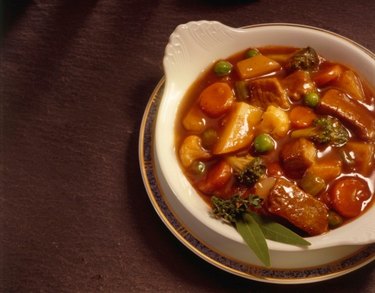Things You'll Need
Slow cooker recipe
Stock

A Crock Pot is the brand name for a variety of slow cookers manufactured by Sunbeam Products. Slow cooking is a cooking style that has been around for centuries, but has gained popularity with contemporary home cooks due to the ease of use. If you want to cook in a Crock Pot without water, you're in luck. Most slow cooker recipes require a substantial reduction in the use of liquid, and many do not require water at all.
Step 1
Find a slow cooking recipe that does not require water. There are countless recipes available online, in magazines and books, especially those geared for Crock Pots. While some soup recipes may call for water, many stews and slow cooked meat recipes will not require any added water at all to cook in the Crock Pot.
Video of the Day
Step 2
Add all of the ingredients required by your recipe to the Crock Pot. Do not fill it more than two-thirds full. Place the ingredients that take longer to cook, such as meat or root vegetables, at the bottom of the pot. Place on top of those, the ingredients that require less time to cook, such as pasta or dairy products. You do not need to add water or liquid because as the food slowly cooks, moisture from the food will rise up to the lid then fall back down.
Step 3
Substitute chicken, beef, fish or vegetable stock for water if you want to add flavor. You may have one of these stocks on hand from a previous meal or in your pantry. You can also purchase regular and low-sodium stock in most grocery stores.
Step 4
Do not take the lid off of the Crock Pot. If you're not cooking with water or other liquids, you want to make sure that the moisture stays inside of the Crock Pot. By removing the lid, you may let important moisture escape, which can cause your food to be dry, and also can reduce the temperature of the Crock Pot, affecting the cooking time.
Video of the Day